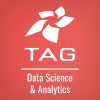news
MSA Team Wins 2023 TAG Master Modeler Competition
Primary tabs
By Shelley Wunder-Smith
Every year, the Technology Association of Georgia (TAG) sponsors a multi-stage data science challenge called Master Modelers, in which teams are tasked with solving a social problem using data. In 2023, the top three academic teams were all students from Georgia Tech’s Master of Science in Analytics (MSA) program; this included the Abnormal Unsupervised Distribution team — consisting of Rakesh Arwini (MSA 23), Cassidy Gasteiger (MSA 23), Samaksh Gulati (MSA 23), and Sai Sri Harsha Pinninti (MSA 23) — as the overall winner.
Participants were asked to use data to provide the National Center for Housing and Child Welfare (NCHCW) and other related nonprofits with meaningful insights, models, and solutions to make a social impact. The NCHCW is a leading organization that helps provide affordable housing for families on the local, regional, and national level, with the ultimate goal of keeping children out of foster care due to homelessness. The organizers of Master Modelers encouraged the teams to focus on creating useful models rather than innovative ones.
“In data science, you can build fancy models, but they don’t always go somewhere,” said Gasteiger. “So in this challenge, it was good to know that even if we built a basic model, it would still be useful.”
“That was an important realization,” Gulati added. “Data science isn’t always about building innovative models. Using our skills to help someone make practical decisions is much more important.”
The primary objective the Master Modeler teams were asked to solve was identifying the relationship between housing insecurity and children being placed into foster care — not a small challenge.
“We had anonymized data for every foster child in the U.S. that showed their reason for removal into foster care and how long they were there, and that was our core dataset,” explained Gasteiger. “We also had an adoption dataset for children who were adopted out of foster care. The first half of our analysis was focused on understanding how housing insecurity affects removal into foster care.”
The team had found a connection between states with high removal rates and difficult housing rental environments. The second stage of their analysis involved actual modeling, through which they could accurately predict whether or not a child would be adopted, as well as if a child would be reunified with their family. The poorer a child is, the less likely they are to be reunited their family.
It was a sobering discovery, but the hope is that by providing NCHCW with this kind of information, the organization will be equipped to act as effectively as possible.
Scott Reynolds, manager of technology business operations at Synovus, which sponsored the competition, said in a LinkedIn post after the event, “Synovus was proud to help sponsor the 2023 TAG Master Modeler Competition to benefit the National Center for Housing and Child Welfare. ... It was amazing to see how data can be used to help so many children across the U.S.”
As the winners, the Abnormal Unsupervised Distribution team was invited to present their findings at the April 2023 INFORMS Business Analytics Conference in Colorado.
“This competition was an incredible experience,” Gulati said. “We learned more about the U.S. foster system and applied data analytics to make recommendations. We welcomed the opportunity to apply what we've learned in the MSA program to solve complex community problems.”
For more information on the 2024 competition, visit the TAG Master Modeler site.
Status
- Workflow Status:Published
- Created By:ecalhoun8
- Created:04/19/2024
- Modified By:ecalhoun8
- Modified:04/22/2024
Categories
Keywords

